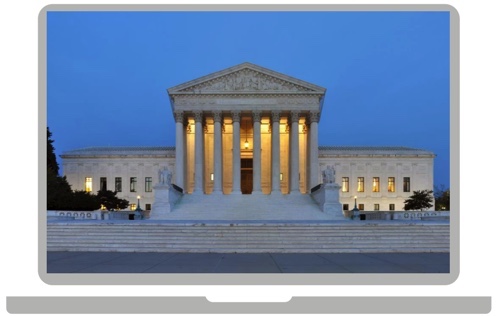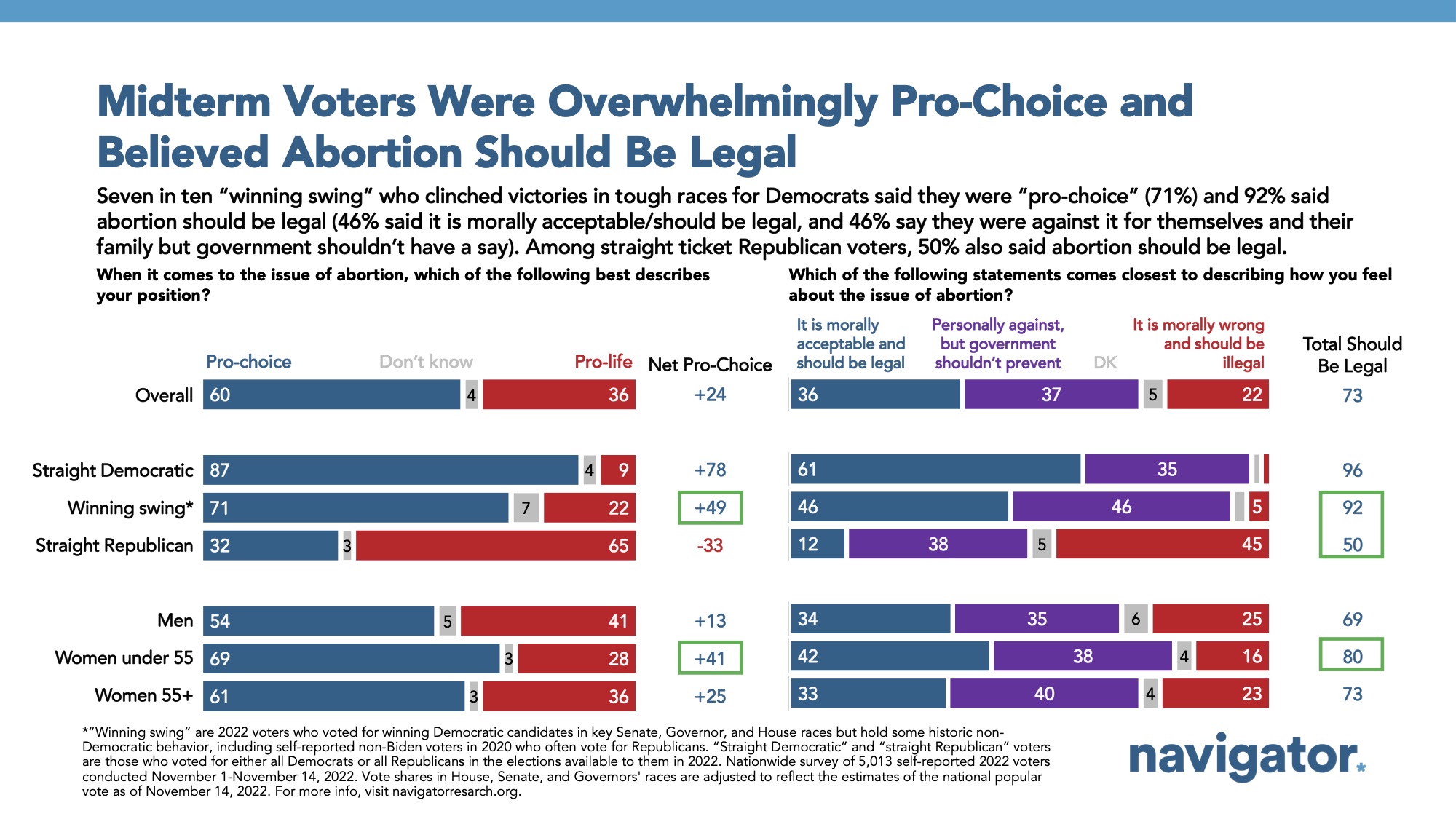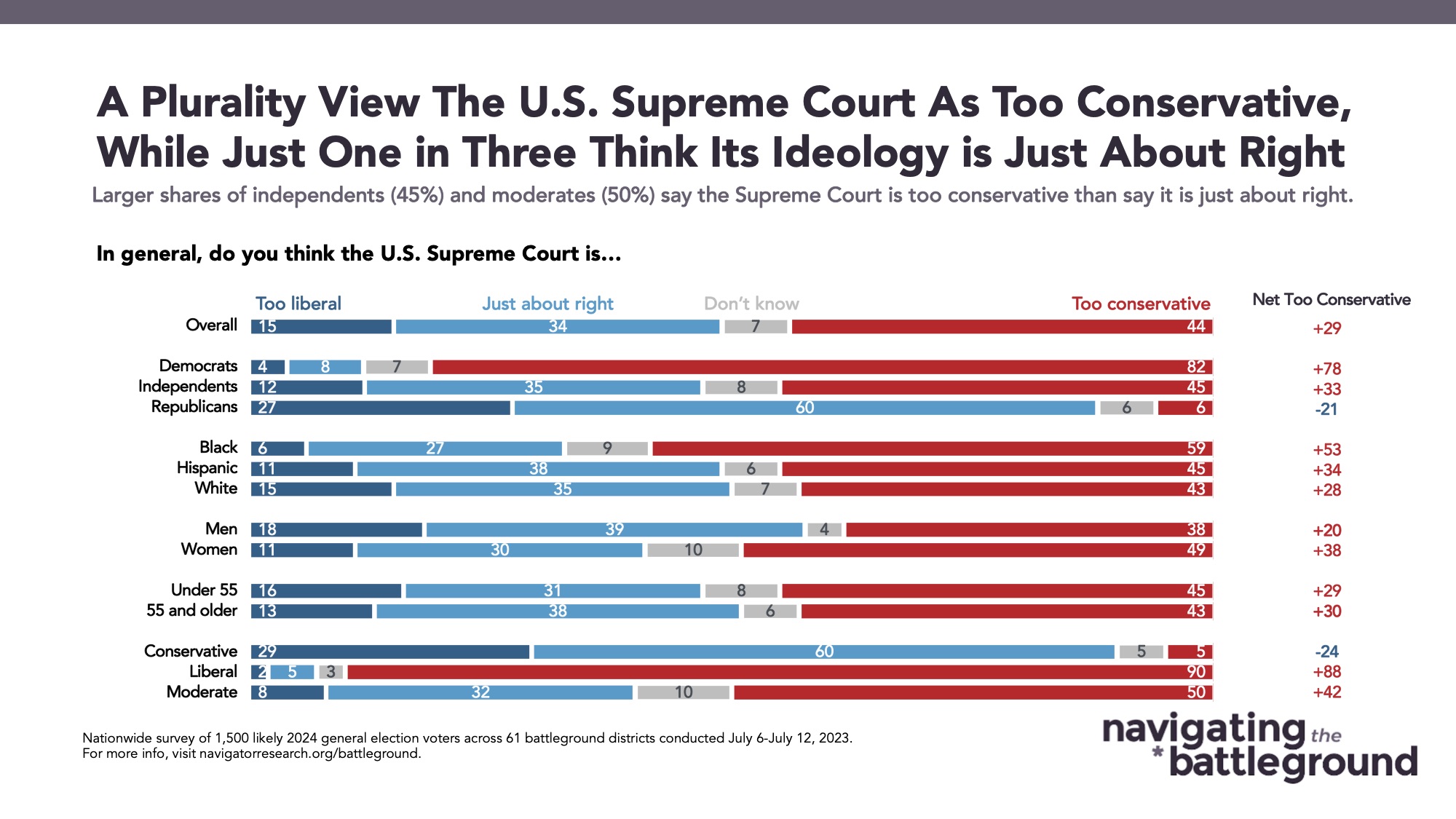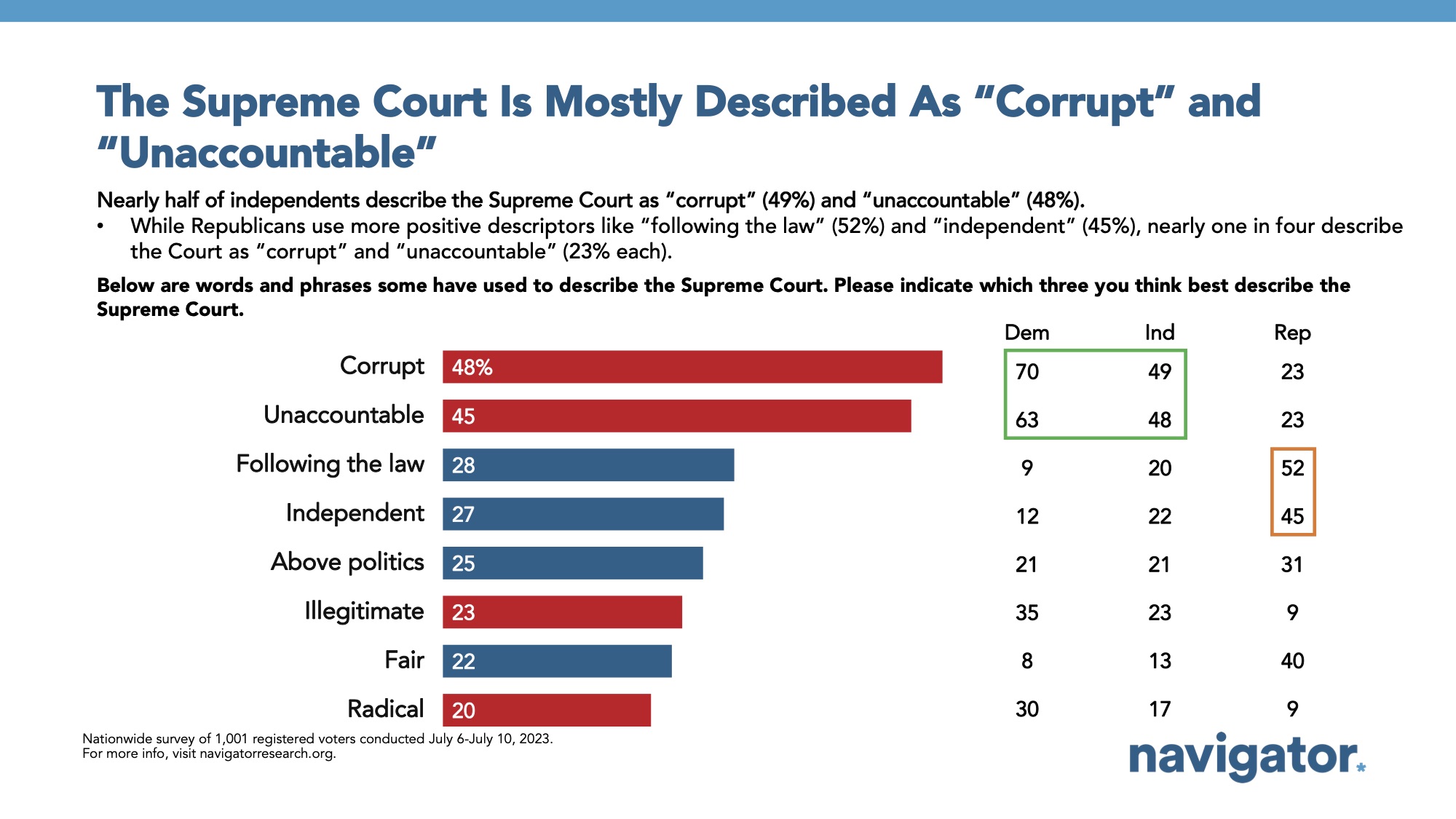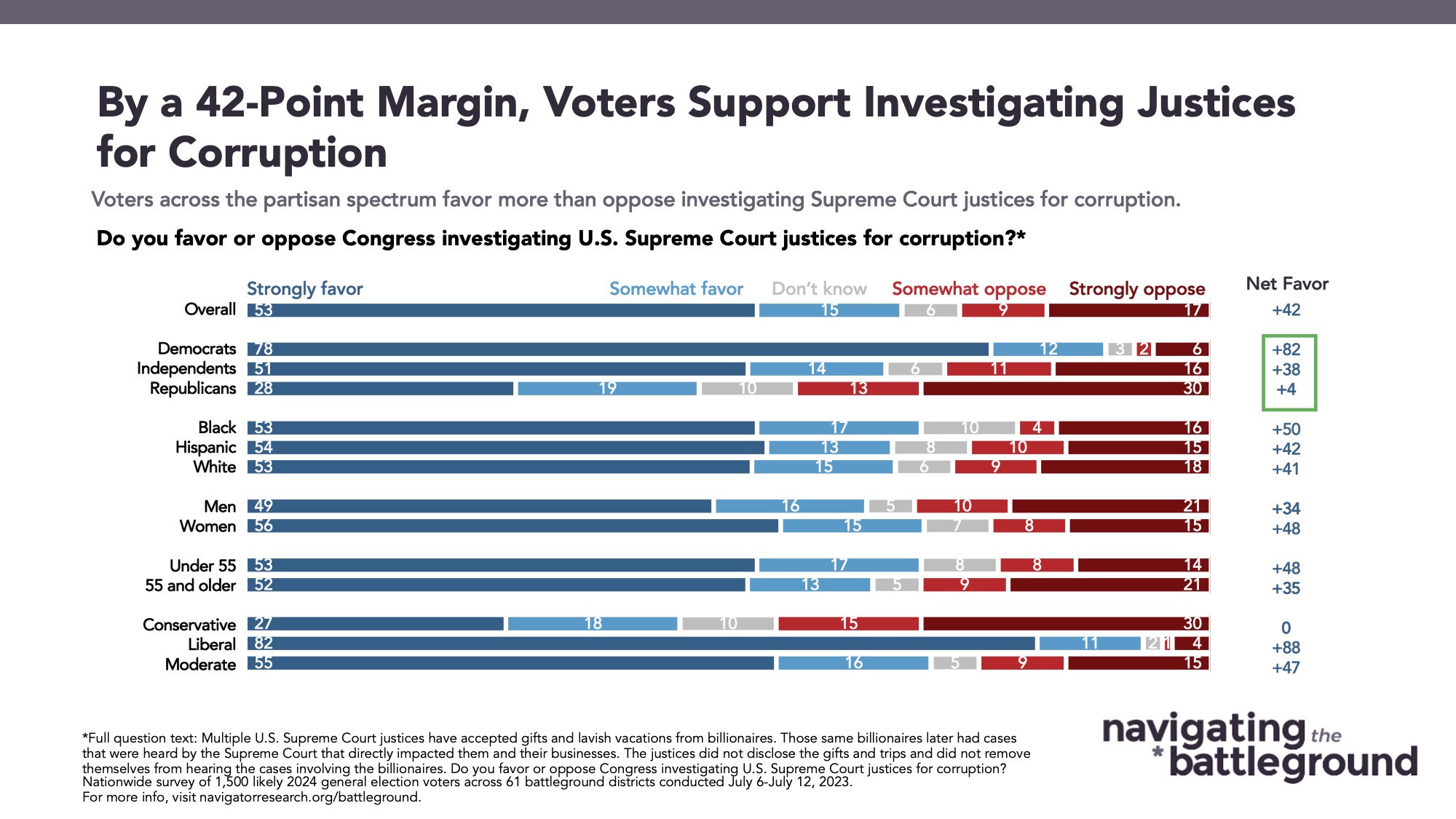In-Depth Analysis: The Supreme Court’s Legitimacy is in Crisis
It is no secret that the Supreme Court is in the midst of a legitimacy crisis. The American public’s perception of the Court has continued to trend downward since the Dobbs decision overturning Roe v. Wade last year, with additional consequential decisions announced throughout this term and ethical scandals plaguing several conservative justices. There are elements of the Court that are alarming or neutral to many Americans, depending on who you ask, and yet a consensus has formed: there is something to be concerned about.
Favorability of the Court has fallen to a historic low, with just 43 percent of Americans viewing the Court favorably following the end of the 2022-2023 term in July. Currently, the Court is underwater by 5 points among the overall electorate (43 percent favorable – 48 percent unfavorable), a net 18-point shift since February of 2022 when a majority of Americans viewed the Court favorably by double-digit margins (net +23; 56 percent favorable – 33 percent unfavorable). The largest shifts in favorability have been among Democrats (from net +12 to net -45) and independents (from net +4 to net -18), while only Republicans have stayed consistent (from net +40 to net +41). Women have soured on the Court by a net 35 points (from net +22 to net -13) as have Americans under the age of 35 by a net 24 points (from net +9 to net -15).
Dobbs’ Impact on Supreme Court Legitimacy
The erosion of the Court’s favorability undoubtedly stemmed from the decision in Dobbs last summer, when the Court’s favorability fell to a net-negative rating for the first time in Navigator tracking. Even prior to the actual decision in June, the leaked decision in May proved to grow mistrust in the Court: a survey conducted immediately following the leaked decision showed that the Court’s favorability had narrowed from net +20 to a net +11 (51 percent favorable – 40 percent unfavorable), including reduced favorability among women (net +7) and Americans under 35 (net -5). In a survey conducted in the days following the overturning of Roe in June, a majority of Americans stated that they disapproved of the Court’s decision to overturn Roe, eliminating the federal right to an abortion as a result (net -15; 39 percent approve – 54 percent disapprove), with greater disapproval among women (net -28; 32 percent approve – 60 percent disapprove) and Americans under 35 (net -19; 36 percent approve – 55 percent disapprove).
We know that the Court’s decision to overturn Roe had a farther reaching effect on the electorate: in Navigator’s post-election survey conducted following the 2022 midterm elections, three in ten voters said abortion was one of the most important issues in deciding who to vote for for Congress. Midterm voters who prioritized abortion among their top issues voted overwhelmingly for Democrats by a 50-point margin (73 percent Democratic candidate – 23 percent Republican candidate). Abortion was a key issue for many voters: 37 percent of women prioritized abortion as a voting issue in the midterm elections, particularly women that attended college (42 percent, and was the most important issue among these voters). Younger voters also saw abortion as an important issue, including 41 percent of voters under 30 and 36 percent of voters aged 30 to 44. Women under 55 said abortion was a top issue for deciding their vote (44 percent), narrowly above inflation (42 percent). Midterm voters were overwhelmingly pro-choice: three in five midterm voters identified as pro-choice (60 percent), and in this electorate, 71 percent of “winning swing” voters—voters who voted for winning Democratic candidates in key Senate, Governor, and House races but hold some historic non-Democratic behavior—also identified as pro-choice. Abortion was also the top issue for women under 30 (52 percent) and Gen Z midterm voters (40 percent). The Court’s decision to overturn Roe, a 50-year old precedent for abortion policy, led to uncertainty of the state of abortion rights and was a clear driving issue in the midterm elections.
Perceptions of the Court’s Encroachment on Freedoms
As the Court approached delivering decisions this summer, Americans’ trust in the institution was split: in May, half of Americans said they trusted the Supreme Court to make the right decisions in the future (50 percent) while the other half said they did not (50 percent), with trust underwater among women (net -8) and Americans under 35 (net -4), marking a 20 point shift since April of 2022, when three in five Americans said they trusted the Supreme Court to make the right decisions (net +20; 60 percent trust – 40 percent do not trust). When the Court began announcing decisions in June, the overall electorate remained narrowly split on trusting the Court (net -2; 49 percent trust – 51 percent do not trust), with greater movement among women (net -10) and Americans under 35 (net -18).
Following the end of the term in July, the perception that the current justices on the Supreme Court were making decisions that take away freedoms, rather than protect freedoms was felt by a plurality of Americans (net +19; 48 percent take away freedoms – 29 percent protect freedoms), including among a majority of women (net +28; 51 percent take away freedoms – 23 percent protect freedoms), and three in five Americans under 35 (net +40; 59 percent take away freedoms – 19 percent protect freedoms). In another survey conducted following the end of the term among Americans living in closely-divided House districts, a plurality of battleground constituents said the Supreme Court was “too conservative” (44 percent), including a plurality of independents (45 percent), with battleground constituents’ expressing little to no confidence in the Supreme Court to issue rulings according to the Constitution and not their own political opinions (43 percent confident – 55 percent not confident). While the Court may view the issue of abortion in the rearview mirror, women and younger Americans continue to view the Court as chipping away at their rights in additional decisions.
In focus groups we conducted among progressive and liberal Democrats under 35 in Virginia, independents in Nevada, and Republicans in Minnesota immediately following the term, we gauged reactions to the various decisions made by the Supreme Court and found that participants across party lines felt “disappointed,” “misrepresented,” and “uncertain” about the Court. On affirmative action, Democrats from Virginia were dumbfounded that something that has been in place for decades was suddenly reversed, while responses to the decisions on student loan debt cancellation and LGBTQ+ were also deemed “upsetting.” Ultimately, many participants fear the further erosion of rights, with one Virginia progressive saying: “It almost feels like going back in time, or rolling… but it almost feels like going back in time or rolling back progress that was made before I was born [with regards to the recent cases].”
Bipartisan Outrage Over Justices’ Unethical Actions
And if disapproval of the Court’s decisions doesn’t feel like enough of a rallying cry this term, the unethical actions of several justices seems to be a separate harbinger that could galvanize Americans. Following detailed reporting of ethical violations conducted by several conservative justices, Americans expressed the most concern around Justice Thomas accepting gifts and luxury travel from a Republican mega-donor for years without disclosing it as federal law requires (73 percent found this concerning), a Republican mega-donor purchasing real estate from Justice Thomas, where Thomas’ mother now lives and pays no rent – and was not disclosed as federal law requires (70 percent), Justice Thomas’ wife being a right-wing activist who supported efforts to overturn the 2020 presidential election as Thomas himself was hearing cases about it (68 percent found this concerning), and Justice Alito’s fishing trip to Alaska that was paid for by a billionaire Republican mega-donor and not disclosed as federal law requires (67 percent found this concerning).
When asked which terms best describe the Supreme Court in July, the top two terms Americans chose were “corrupt” (48 percent) and “unaccountable” (45 percent). Three in five Americans under 35 view the Court as “corrupt” (60 percent). Furthermore, by a 20-point margin, Americans agreed with the argument that “the Supreme Court is increasingly corrupt and facing a legitimacy crisis because it is putting politics above the law” (60 percent) over the argument that “the Supreme Court is doing its job independently and fairly by deciding cases based on the law, not politics” (40 percent). In focus groups conducted in July, participants across party lines were appalled by the unethical actions, lack of transparency, and absent consequences for the justices’ behavior. Ethics questions evoked bipartisan outrage and calls for Court reform in both the surveys and focus groups conducted following the end of the Court’s term.
As a Minnesota Republican put it: “Why isn’t there ethics rules for them? That’s my question.” In our survey conducted in July, two in three Americans supported term limits for Supreme Court justices and establishing ethical oversight: by a 42-point margin, 65 percent of Americans support setting term limits for Supreme Court justices (only 23 percent are opposed). There is majority support for term limits across partisanship, including three in four Democrats (73 percent), three in five Republicans (59 percent), and a majority of independents (54 percent), and a majority of Americans prefer justices serving fixed 18-year terms (59 percent support, compared to 22 percent who prefer the current way the Supreme Court works where justices serve for life). Seven in ten Americans support Congress conducting investigations into potential ethics violations by Supreme Court justices (net +52; 69 percent support – 17 percent oppose), including 83 percent of Democrats, 63 percent of independents, and 55 percent of Republicans. A similar share of Americans support Congress passing legislation requiring the Supreme Court adopt a code of conduct and holding justices to stricter financial disclosure rules, including investigating formal complaints against justices by judges serving on lower courts (net +50; 67 percent support – 17 percent oppose).
Additionally, two in three Americans also support the Supreme Court establishing an independent investigative body and being advised by an ethics counsel (net +48; 65 percent support – 17 percent oppose), with net positive support among Democrats (net +75), independents (net +34), and Republicans (net +20). Participants in the focus groups conducted in July felt similarly that the Court shouldn’t impose rules on itself given the lack of trust and transparency that already exists. A majority of battleground constituents also stated that they strongly favor Congress investigating the U.S. Supreme Court justices for corruption, with Americans across party lines supporting investigations, including 90 percent of Democrats, two in three independents (66 percent), and even a narrow plurality of Republicans (47 percent favor – 43 percent oppose). With bipartisan support for reforms at levels this high, it is no wonder that Minnesota Republican asked “Why isn’t there ethics rules for them?”
The Future of the Supreme Court’s Legitimacy Crisis
As we get further away from decisions and scandals, it’s likely the outrage will fade, as our attention is pulled to the latest indictment, fluctuating gas and egg prices, or even the newest Taylor Swift re-recording. It’s true that Supreme Court decisions and justices don’t take up real estate in most Americans’ minds on a daily basis, and when Americans’ think of congressional priorities, jobs and the economy, and inflation remain at the top of the list. It’s only fair to recognize that this makes action like Court reform legislation and investigations more difficult as we move past the latest Court term and ethical dilemmas, and while change overnight seems unlikely, the Court’s legitimacy crisis does not seem to be going anywhere.
In the next term, the Court granted review on cases involving racial gerrymandering, the possession of firearms by persons accused of domestic violence, social media and the first amendment, along with many other cases that could have far reaching consequences. Continuing to assess Americans’ perception of the Court as they take away or protect freedoms we have come to rely on is imperative. So is understanding trust in an institution that has been wracked with scandals. Here, at Navigator Research, we’ll continue to keep a pulse on those perceptions and strive to understand how trust in the Court can be restored or how the Institution can be reformed.
